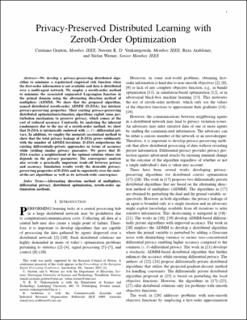| dc.contributor.author | Gratton, Cristiano | |
| dc.contributor.author | Kumar Dasanadoddi Venkategowda, Naveen | |
| dc.contributor.author | Arablouei, Reza | |
| dc.contributor.author | Werner, Stefan | |
| dc.date.accessioned | 2022-04-21T12:53:12Z | |
| dc.date.available | 2022-04-21T12:53:12Z | |
| dc.date.created | 2022-02-08T09:25:21Z | |
| dc.date.issued | 2022 | |
| dc.identifier.citation | IEEE Transactions on Information Forensics and Security. 2022, 17 265-279. | en_US |
| dc.identifier.issn | 1556-6013 | |
| dc.identifier.uri | https://hdl.handle.net/11250/2992040 | |
| dc.description.abstract | We develop a privacy-preserving distributed algorithm to minimize a regularized empirical risk function when the first-order information is not available and data is distributed over a multi-agent network. We employ a zeroth-order method to minimize the associated augmented Lagrangian function in the primal domain using the alternating direction method of multipliers (ADMM). We show that the proposed algorithm, named distributed zeroth-order ADMM (D-ZOA), has intrinsic privacy-preserving properties. Most existing privacy-preserving distributed optimization/estimation algorithms exploit some perturbation mechanism to preserve privacy, which comes at the cost of reduced accuracy. Contrarily, by analyzing the inherent randomness due to the use of a zeroth-order method, we show that D-ZOA is intrinsically endowed with (ϵ,δ)− differential privacy. In addition, we employ the moments accountant method to show that the total privacy leakage of D-ZOA grows sublinearly with the number of ADMM iterations. D-ZOA outperforms the existing differentially-private approaches in terms of accuracy while yielding similar privacy guarantee. We prove that D-ZOA reaches a neighborhood of the optimal solution whose size depends on the privacy parameter. The convergence analysis also reveals a practically important trade-off between privacy and accuracy. Simulation results verify the desirable privacy-preserving properties of D-ZOA and its superiority over the state-of-the-art algorithms as well as its network-wide convergence. | en_US |
| dc.language.iso | eng | en_US |
| dc.publisher | Institute of Electrical and Electronics Engineers (IEEE) | en_US |
| dc.title | Privacy-Preserved Distributed Learning With Zeroth-Order Optimization | en_US |
| dc.type | Peer reviewed | en_US |
| dc.type | Journal article | en_US |
| dc.description.version | acceptedVersion | en_US |
| dc.rights.holder | © IEEE. Personal use of this material is permitted. Permission from IEEE must be obtained for all other uses, in any current or future media, including reprinting/republishing this material for advertising or promotional purposes, creating new collective works, for resale or redistribution to servers or lists, or reuse of any copyrighted component of this work in other works. | en_US |
| dc.source.pagenumber | 265-279 | en_US |
| dc.source.volume | 17 | en_US |
| dc.source.journal | IEEE Transactions on Information Forensics and Security | en_US |
| dc.identifier.doi | 10.1109/TIFS.2021.3139267 | |
| dc.identifier.cristin | 1998881 | |
| dc.relation.project | Norges forskningsråd: 300102 | en_US |
| cristin.ispublished | true | |
| cristin.fulltext | postprint | |
| cristin.qualitycode | 2 | |
